HOMILY WEEKDAY 20 05 – Year II
Be Humble and Walk the Talk:
Memorial of St. Pius X
(Ezk 43:1-7; Ps 85; Mt 23:1-12)
***********************************
If a topic were to be given to this homily, emerging from the readings, it would be “Be Humble and Walk the Talk.”
Once again in the Gospel, we see Jesus being very critical of the religious leaders of his day. We are to do what they say but not do what they do, because in their lack of faith and hypocrisy, they do not walk the talk themselves.
To underline the point, he goes on to say something that our Protestant brothers and sisters sometimes use to confront us and our Catholic priesthood – Jesus said that we were not supposed to call anyone “Father.”
That is true, but he also said that we are not to call anyone “teacher” or “instructor” – and how could we operate as a society if we never used those terms – especially within a system of education.
The explanation is simple. Jesus here is using what is called Semitic Hyperbole, or holy exaggeration to underline the point he is making, which is that God must come first in our lives, and that there is no room for the false pride and stubborn self-will of the Pharisees in our conduct.
These statements about teacher and father are not to be taken literally – they are there to make a point that we are meant to catch and apply to our lives. That point is that we are to be humble and walk the talk by our faith in him and our actions that live out that faith.
Those qualities and actions become clear in the psalm – steadfast love, faithfulness, work for peace, and righteousness that is basically a right relationship with God, others, ourselves and all of God’s creation. It is this way that we will experience salvation and the glory of God will enter into our lives.

Sealed Golden Gates in Jerusalem
We are told in the first reading that this glory of the Lord will come from the East and enter the Temple from the Eastern Gate. There were 11 gates in the walls of old Jerusalem – 7 of them are still open and operational. It is interesting that the Muslim Sultan in the 7th century knew the Hebrew belief that the Messiah would come to Jerusalem by the Eastern gate so he sealed that gate, saying that no messiah will now be able to enter Jerusalem. Ironically, he was about 7 centuries too late, because Jesus had entered Jerusalem by that gate on Palm Sunday. That prophecy and belief had already been fulfilled.
Jesus is the new Moses, the new Israel, the new Temple that was destroyed and raised up three days later. It is he who makes his throne in us, whose presence is in us, making us now the throne of his glory. It is this that now impels us to live as his followers in the power of his Spirit, living all those qualities listed in the psalm.
 Today the Church honors St. Pius X, born Guiseppe Sarto in Riese, Italy, in 1835. His mother was a seamstress and his father a parish clerk who died when Guiseppe was 16, leaving the family in financial straits. His mother insisted that the boy continue his education and fulfill his desire to become a priest. Ordained at age 23, he was involved in parish ministry for 17 years. He became a bishop in 1884, a cardinal in 1892 and was elected pope in 1903. He died in 1914, soon after the outbreak of World War I.
Today the Church honors St. Pius X, born Guiseppe Sarto in Riese, Italy, in 1835. His mother was a seamstress and his father a parish clerk who died when Guiseppe was 16, leaving the family in financial straits. His mother insisted that the boy continue his education and fulfill his desire to become a priest. Ordained at age 23, he was involved in parish ministry for 17 years. He became a bishop in 1884, a cardinal in 1892 and was elected pope in 1903. He died in 1914, soon after the outbreak of World War I.
His recommendations and encyclicals reflect his pastoral background: he advocated frequent communion for adults, sacramental preparation for children and instruction in catechism for everyone. In his concern for the Church in a rapidly changing world, he issued a decree against writers holding modernist ideas in philosophy and theology and wrote an encyclical condemning modernism in all its manifestations. He was canonized in 1954.
The Eucharist is truly a humble meal, calling us to be humble in turn, and challenging us to live lives of loving service, as did St. Pius X.



